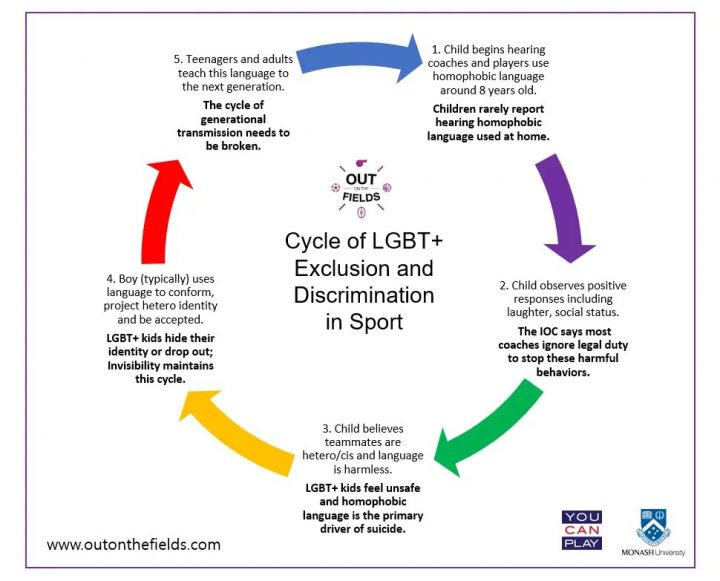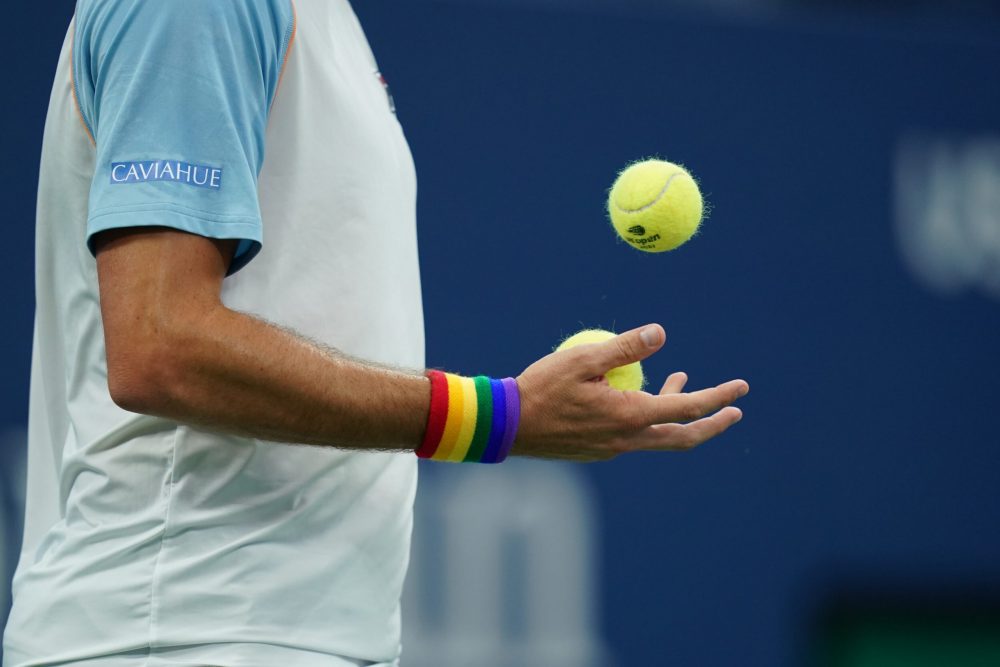During the first week of the US Open, there was an abundance of rainbow-theme flags and wristbands worn by both players and fans to mark the tournament’s first-ever Open Pride Day.
The event was part of the USTA’s Diversity and Inclusion strategic platform which aims to make tennis more inclusive. Unlike the women’s game, there are no openly LGBTQ+ players on the men’s Tour and there have been few historically, even though various players have spoken of their support for anybody on the Tour who decides to come out. Including Stefanos Tsitsipas and newly crowned US Open champion Daniil Medvedev, who were questioned about the topic following their second round matches. Meanwhile, Canada’s Felix Auger-Aliassime revealed that there is an ongoing survey related to LGBTQ+ issues being conducted by the ATP.
“Recently I’ve started doing a survey inside the ATP about the LGBTQ+ community,” he said. “It’s important these days to be aware of that and to be open-minded and the ATP needs to do that, in today’s time it’s needed.
“The reason we don’t have openly gay players on the ATP Tour, I’m not sure of the reason, but I feel me, as a player, it would be very open, very welcome. Statistically, there should be some, but for now there’s not.”
In response to Auger-Aliassime’s comment, UbiTennis looked into the work currently being done by the ATP alongside two other parties. Their decision to venture into LGBTQ+ representation on the Tour is part of their recent commitment to support the mental health and wellbeing of their players and staff. Last year, in May, they formed partnerships with Headspace and Sporting Chance.
The survey currently being conducted by the ATP started after the governing body of men’s tennis reached out to Lou Englefield, the director of Pride Sports, a UK organisation that focuses on LGBTQ+phobia in sport and aims to improve access to sport for all LGBTQ+ people. Through their connection, they contacted Eric Denison, a behavioural science researcher at Monash University’s School of Social Sciences. Denison was the lead author of the Out on the Fields study, the first international study on homophobia in sport and the largest conducted to date.
“I have been personally impressed with the initiative of the ATP and their desire to find ways to mitigate the broad impact of homophobic behaviour (in particular), not only on gay people, but on all players.” He told UbiTennis during an email exchange.
“We know of no other sporting governing body in the world that has been proactive on LGBTQ+ issues, and has taken a strong focus on engaging with both the LGBTQ+ community and scientists to find solutions.”
Denison says the norm has been for sports bodies to address this issue after they have been either pressured to do so or if the LGBTQ+ community got the ball rolling themselves. Incredibly, research conducted as part of the Out On The Fields initiative documented 30 separate studies which found sports organisations ignored discrimination experienced by LGBTQ+ people in sport.

Monash University has supplied the ATP with a series of scientifically validated questions, which they are using to ‘look under the hood’ at the factors which supports a culture where gay or bisexual players feel they are not welcome. The methodology is similar to a study Denison conducted in 2020 that focused specifically on the team sports rugby union and ice hockey.
“We suspect that tennis isn’t inherently more homophobic than other sports, or traditionally male settings. Instead, there is a disconnect between people’s attitudes towards gay people (e.g. the recent pro-gay comments by top players) and their behaviour, specifically their use of homophobic banter and jokes,” said Denison.
“This behaviour, which is largely habitual, creates a hostile climate for young gay/bi people who drop out or hide their sexuality. This means gay/bi players are invisible in youth tennis and leads to the downstream problem of no professionals. The banter/jokes continue because people think it is harmless.”
The hope is that players will also agree to be interviewed by the researchers for them to get a better understanding. All of the results will then be used by Pride Sports and Monash University to recommend evidence-based solutions. It is unclear as to how long the study will take or when the findings will be ready.
Former top 100 player Brian Vahaly is one of the few players to have been both openly gay and played at the highest level of the men’s game. However, he didn’t fully come to terms with his sexuality until after retiring from the sport at age 27. Speaking to UbiTennis earlier this year, Vahaly shed light on the potential barriers for gay players.
“There were a lot of homophobic jokes made on Tour. It’s a very masculine and competitive environment,” he said. “You don’t see a lot of gay representation, except for the women’s Tour. With me not having the personality of an outspoken advocate (for LGBTQ+ issues), certainly not in my twenties, I needed some time to understand myself. To me, in tennis I didn’t feel like there was anybody to talk to or anybody that was going through anything similar.”
The ATP has spoken with Vahaly about their initiative and he has become ‘quite involved.’ Through their discussions, he got acquainted with Denison for the first time. As a professional, Vahaly peaked at a ranking high of 64th in the world and won five Challenger titles. After retiring from the Tour, he has served on the USTA’s board of directors since 2013.
“I am happy to hear that the ATP is finally taking action to address this issue. I’m impressed they are taking a thoughtful, data-driven approach to make a meaningful difference here,” he told UbiTennis.
The ATP aims to make the men’s Tour more welcoming to potential LGTBQ+ athletes playing either now or in the future. For those who question if such an initiative is important in 2021, you only have to look at the younger demographic.
Sportsnet quoted CDC data from 2019 which showed that 26% of American LGBTQ+ teenagers aged 16 or 17 has contemplated suicide, five times more than those who identify as straight (5%). Among those teenagers who heard homophobic terms, 33% self-harmed and an additional 40% considered doing so.
More than 2000 players around the world currently have an ATP ranking.






